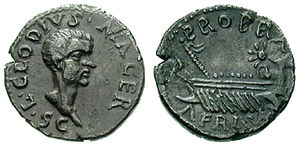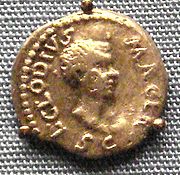
Lucius Clodius Macer
Encyclopedia


Legatus
A legatus was a general in the Roman army, equivalent to a modern general officer. Being of senatorial rank, his immediate superior was the dux, and he outranked all military tribunes...
of the Roman Empire
Roman Empire
The Roman Empire was the post-Republican period of the ancient Roman civilization, characterised by an autocratic form of government and large territorial holdings in Europe and around the Mediterranean....
in Africa in the time of Nero
Nero
Nero , was Roman Emperor from 54 to 68, and the last in the Julio-Claudian dynasty. Nero was adopted by his great-uncle Claudius to become his heir and successor, and succeeded to the throne in 54 following Claudius' death....
. He revolted in May 68, cutting off the food supply of Rome
Rome
Rome is the capital of Italy and the country's largest and most populated city and comune, with over 2.7 million residents in . The city is located in the central-western portion of the Italian Peninsula, on the Tiber River within the Lazio region of Italy.Rome's history spans two and a half...
, possibly at the instigation of Calvia Crispinilla. Although encouraged by Galba
Galba
Galba , was Roman Emperor for seven months from 68 to 69. Galba was the governor of Hispania Tarraconensis, and made a bid for the throne during the rebellion of Julius Vindex...
, Macer raised a legion Legio I Macriana liberatrix
Legio I Macriana liberatrix
Legio I Macriana liberatrix was a Roman legion levied in Africa by the governor Lucius Clodius Macer in 68....
in addition to the Legio III Augusta
Legio III Augusta
Legio tertia Augusta was raised in the year 43 BCE most likely by the consul Gaius Vibius Pansa and the emperor Augustus who served the Roman Empire in North Africa until at least the late 4th century CE. It is possible that it fought in the battle of Philippi against the murderers of Caesar...
that he already commanded, presumably raising suspicion that Macer also harbored imperial ambitions, and in October of 68 Galba had him killed by the procurator
Procurator (Roman)
A procurator was the title of various officials of the Roman Empire, posts mostly filled by equites . A procurator Augusti was the governor of the smaller imperial provinces...
Trebonius Garutianus. Papirus, the centurion of Mucianus, was implicated in his assassination.
He produced denarii
Denarius
In the Roman currency system, the denarius was a small silver coin first minted in 211 BC. It was the most common coin produced for circulation but was slowly debased until its replacement by the antoninianus...
which are extremely rare today. Only about 85 are known to exist, of which only 20 bear his portrait. It is remarkable that he uses the formulaic abbreviation S C (senatus consulto) on his denarii, for this abbreviation otherwise had not appeared on Roman silver coins since about 40 BC. We may take this and his decision to portray himself without a laurel wreath or a diadem as evidence that he wished to portray his revolt as being against Nero, not the senate.
Sources
- Tacitus, Cornelius. HistoriesHistories (Tacitus)Histories is a book by Tacitus, written c. 100–110, which covers the Year of Four Emperors following the downfall of Nero, the rise of Vespasian, and the rule of the Flavian Dynasty up to the death of Domitian.thumb|180px|Tacitus...
(Cambridge: University Press, 2002) ISBN 0-521-57072-7

